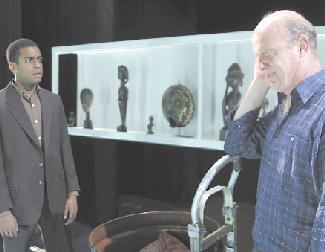SITE GUIDE
SEARCH
REVIEWS
REVIEW ARCHIVES
ADVERTISING AT CURTAINUP
FEATURES
NEWS
Etcetera and
Short Term Listings
LISTINGS
Broadway
Off-Broadway
NYC Restaurants
BOOKS and CDs
OTHER PLACES
Berkshires
London
California
New Jersey
DC
Philadelphia
Elsewhere
QUOTES
TKTS
PLAYWRIGHTS' ALBUMS
LETTERS TO EDITOR
FILM
LINKS
MISCELLANEOUS
Free Updates
Masthead
Writing for Us
A CurtainUp Berkshires Review
Black Sheep
By Elyse Sommer

Daniel Breaker and Gerry Bamman
(Photo: Joe Schuyler) |
Even when the earnest Blessing gives vent to his comic impulses he does not abandon his trademark Blessing Op-Ed page to stage sensibility. With his comic mask in place, he also tends towards abstraction that is more precious than profound and generally over-spiced with bizarre twists. His monodrama, Chesapeake, was a case in point; so, I'm afraid is Black Sheep, his latest venture into comedy which premiered in Florida and is currently being given its regional premiere at Barrington Stage.
Despite a superb cast fully up to an outstanding director and stylish stagecraft, Blessing's intriguing departure from realism never fulfills the promise of its attention getting beginning. Nor does it deliver on the author's promise to provide us with insights into our attitudes about money and race in the ever changing world we live in via a family invented to reflect our darkest impulses. The Winships are WRCs (White, Rich, and Complacent), with all genuine emotion bleached out of them -- until the arrival of the title character, a black cousin, transforms their darkest fantasies into nightmarish reality. (The family name no doubt is intended to convey its own metaphoric implications of winning wealth, coming to America on a whites only ship or, in the case of the cousin, on a slave ship).
A friend who saw the play in Florida told me that the audience liked the first act but left the theater dissatisfied and confused after the second. The author took their reaction to heart and immediately began rewriting the script. Thus, the production now at Barrington Stage plays out its abstract and very dark vision of the money worshipping, emotionally bankrupt and race-conflicted Winships in just eighty-five minutes and without an intermission. Sad to say, this streamlined version has so much repetition that it feels uncut.
As already stated, the play begins well, with several cinematic glimpses of various characters looking through binoculars. We have no idea what they're looking at or just where we are. The program lists the place as "Home" but the only signs of a home setting are some pictures on one wall. Everything else is stark and bare and unhomey. Still, those blackout startup scenes and the catchy incidental music pique our interest and we sit back waiting to be amused (this is after all billed as a comedy) and challenged by a playwright with a reputation as a provocateur.
The initial anticipation carries through the first full scene in which we are introduced to Carl (Daniel Breaker), the black Winship cousin, and his Uncle Nelson (Gerry Bamman). Their interchange fills us in on the details of the relationship and the reason Carl has come to live in what turns out to be the Winship's poolside guest house. It seems, Carl, has just spent five years in jail for killing his hateful white half-brother who tried to force him to say "I'm a coon." Though still a boy he was tried as an adult and now has nowhere to go since neither his father (Nelson's brother) or his black mother and her people want anything to do with him. The more liberal-minded (or so they say and think) Nelson Winships have thus offered to take him. Nelson, who tries on new religions like new shoes, in fact, want to adopt him. That getting to know you scene between the quiet Carl and his uncle, played with delicious excess by Bamman is dizzyingly funny.
Things continue amusingly as we meet the rest of these whacky WASPs: Nelson's wife Serena (Sally Wingert), his son Max (Haynes Thigpen) and his girl friend Elle (Sarah Rafferty) with whom Max seems to make frequent and passionate love -- though his real partner is a pillow since Elle is holding out for marriage and a diamond ring. Sarah Rafferty is especially good as the dumb-as-a-fox femme fatale but it's Gerry Bamman who holds our attention and tickles our funny bone even after the play loses steam. If you've followed Bamman's career, you'll recognize the double-edged humor of Nelson's somewhat regretfully telling Carl that he can no longer be active in any war now that he's a Quaker, then recalling that being a Quaker did not deter Nixon -- the president Bamman so memmorably portrayed in Nixon's Nixon.
Seeing Lee Blessing's Black Sheep and the late Joe Orton's Loot within days of each other makes for inevitable comparison. Even after almost forty years Loot holds its darkly funny edge. Black Sheep feels and looks edgy but shoots itself in the hoof with well-meaning but painfully transparent ideas.
To conclude, a comment on the black curtain with which artistic director Julianne Boyd has encircled the rear center section of the Consolati Art Center. Its intent is to create an aura of intimacy for this high school auditorium-cum-summer theater. The effect is rather curious and merely call attention to a physical problem. It's not special curtains, but lots olocal cultural treasures.
LINKS TO REVIEWS OF PLAYS MENTIONED
Chesapeake
Cobb/Blessing, Lee
Down the Road
Thief River/Blessing, Lee
Two Rooms
Loot
| BLACK SHEEP
Author: Lee Blessing Director: Daniel Fish Cast: Gerry Bamman (Nelson Winship), Sally Wingert (Serene Winship), Daniel Breake (Carl Winship), Haynes Thigpen (Max Winship), Sarah Rafferty (Elle) Scenic Design: Andrew Lieberman. Costumes: Kaye Voyce Lights: Peter West Sound: Eric ShimEric Shim Running time: Reviewed by Elyse Sommerbased on performance based |



6,500 Comparative Phrases including 800 Shakespearean Metaphors by CurtainUp's editor.
Click image to buy.
Go here for details and larger image.
